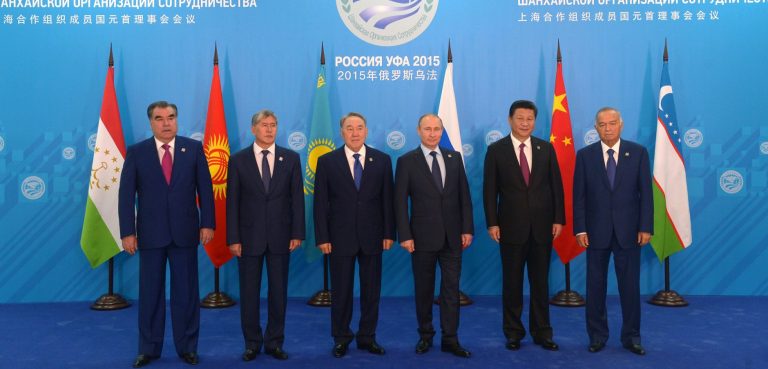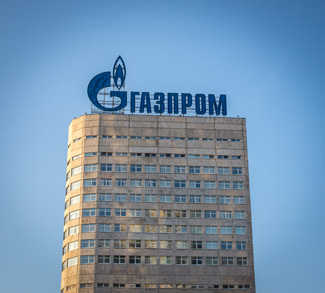In 1904, Sir Halford J. Mackinder, one of the founders of classical geopolitics, conceptually divided the world into three parts: the pivot area of northeastern and central Eurasia, the surrounding area of an inner crescent of remaining Eurasian and North African territories, and an outer crescent of all the remaining oceanic countries. His notion was that any malicious power able to organize the defined pivot area, which became known as the ‘Heartland,’ and accumulate sufficient highly mobile manpower, inevitably becomes aggressive toward its neighbors on all sides. Mackinder warned that if anyone succeeds in adding a substantial oceanic frontage to the Heartland, they might constitute a “peril” to the world’s freedom. In Mackinder’s view, Eastern Europe is the key region which empowers the land empire claiming the Heartland. Within this geopolitical framework, it can be argued that the Russian claim over Ukraine is not a mere land grab, but an attempt to substantially increase Heartland’s manpower and resources for further expansion beyond currently defined borders. Russia’s defeat in Ukraine is thus crucial for preventing a new global war and subjugation of the wider free world by the resurgent power in the Heartland, along with its geostrategic allies.
Eastern European Plain as the Heartland’s Ring of Power
The geopolitical importance of the Heartland lies in the geographical conditions which provide advantages to any power controlling it. In 1904, Mackinder defined the Heartland as territories over the basins of all rivers whose waters drain either into the hardly navigable Arctic Ocean or into land-locked salt lakes, thus being immune from any potential naval invasion. Effectively, the Heartland encompasses lands to the north from the central Asiatic desserts, between imaginary lines from the Himalayas mountains northeast through the Gobi Desert, and from the Zagros Mountains through the Caucasus in the northwestern direction almost to the Gulf of Finland. The steppes of the “Great Lowland” stretch unobstructed from Manchuria in the East to Central Europe in the West, offering high land mobility, employing horses in the past and railways in the present. Mongols were not the first to exploit this geographical advantage, but they were the first organizers who emerged from the Heartland and attacked all sides into the inner crescent and, in the 13th century, hammered out the largest (to date) land empire.
Mackinder highlighted the huge economic potential of those vast spaces in terms of wheat to grow, ores to mine and fuel to extract, sufficient to organize large-scale industries and formidable manpower. These Heartland opportunities were eventually exploited by the Russian Empire, which replaced the Mongolian, and was later resurrected as the Soviet Union. In 1943, Mackinder reaffirmed the validity of all his previous assessments, concluding that the Heartland is “the greatest natural fortress on earth,” being itself able to attack in any direction.
Eastern Europe has always been a geopolitical gateway, whose control is of significant consequence. Mongols, vanquishing as deep westward as the Danube River, and other nomads before them, prompted local inhabitants either to fight, flee, or collaborate, and states of the day to react or fall under pressure of invasion. The Russian Empire occupied peninsular Europe as deep as Finland, Poland, and Romania, threatening the Ottoman’s hold of Asia Minor and attaining great influence over the Southern Slavs in the Balkans in the 19th century. Geopolitical rivalry in the latter region, between the German powers of Prussia and Austria in the central lands of Europe and the Russian Empire, eventually ignited the First World War. Germans aimed to take control over economic and manpower core of the Heartland, which, according to Mackinder, laid within the East European ring of the Black and Baltic Seas and the Volga River. In this period Mackinder extended his definition of Heartland to the Balkans and Berlin, arguing that the potential military seizure of Constantinople or Copenhagen respectively would block access to the Atlantic Ocean and render the Black or Baltic Seas effectively isolated. The Second World War was started in Europe by Berlin and Moscow, an alliance against which Mackinder warned in 1904 as the one bringing into sight “the empire of the world.” Nevertheless, Nazi Germany, driven by its geostrategy of “organic” growth, attacked the Soviet Union to gain additional “living space” by cleansing the East European plain from its non-German tenants. In the aftermath of that war, the Soviet Heartland regained control of the gateway into peninsular Europe and through it once again expanded to the Danube River and Berlin.
Mackinder’s Misconception about Russia
An important historical flaw in Mackinder’s East European argument, aggravated by the ongoing Russo-Ukrainian war, was the consideration of the lands between the Black and Baltic Seas as well as its inhabitants as Russian, while they were merely being occupied by the power from the Heartland. “The real Russia…”, Mackinder writes in 1919, “the homeland of the Russian people, lies wholly… between the Volga and the Carpathians and between the Baltic and Black Seas.”
This misconception begins with a blind trust in the claim that Russia is somehow an heir to the powerful state of the 9th-13th centuries – Kyivan Rus’, which governed lands from the Gulf of Finland to the Black Sea. The state, which took shape around Moscow, namely Muscovy, under Mongolian rule and influence, had distinctively different political, civil, and military institutions from its European neighbors, medieval Kyivan Rus’ or even Byzantium. Muscovites’ government style was characteristically despotic, in contrast to their strongly parliamentarian western neighboring states, whom they set to conquer as soon as Muscovy gained independence in the 15th century. At the same time, Kyivan legal and administrative traditions were first preserved in its western principalities, which became the Kingdom of Ruthenia (Latin for Rus’) in the 13th century, and later adopted by Baltic Lithuania, which took over most of the Kyivan lands down to the Black Sea from Mongols in the 14th century. Ruthenian language, spoken by the common folk in those lands, Snyder concludes, morphed into Ukrainian.
By the beginning of the 18th century, Muscovy gradually subjugated peoples and states between the Gulf of Finland and the Black Sea. To legitimize their rule, Muscovites took a new aggrandized name, corrupted from the learned history of annexed Kyiv – the Russian Empire. After the First World War, Poles and Balts, among others, in line with Mackinder’s advocacy for the buffer tier of independent states between Russia and Germany, re-established their nation-states, even if only for two decades. Ukrainians, unfortunately, were of lower priority to Western allies at that time. To Russian Bolsheviks, on the contrary, Ukraine held pivotal economic and manpower potential without which efforts to reforge an empire were futile. Eventually, after four years of defending their Republic, the Ukrainian people’s resistance crumbled unaided under brutal Russian invasion. Nevertheless, with the end of the Cold War, by 1991 Russia lost its grip over the lands and non-Russian peoples of Eastern Europe, who ultimately regained independence and internationally recognized sovereignty over their state borders.
Ukraine Remains the Key
Three decades later, Russo-Ukrainian war is a new manifestation of an aggressive power from the Heartland into peninsular Europe. Russians started their invasion of Ukraine in 2014 where they held military opportunity – from its leased military base in Sevastopol into Crimea, annexing it, and where geography historically proved a vulnerability – from Mackinder’s eastern steppes into Donbas. Despite the overwhelming superiority of the naval fleet at the beginning of the full-scale invasion, by 2024 Moscow had lost its dominance in the Black Sea to Ukrainian unconventional military techniques, among which has been a highly effective use of drone warfare.
The more territories Moscow is allowed to seize – the thinner, if any, a buffer zone between the mobilized Heartland and Western allies will remain in the gates of Europe; if the whole of Ukraine’s Black Sea shore is seized, Russia will strengthen its naval power there and will directly threaten the southern European flank.
On top of lands, the occupation of Ukraine aims to replenish and strengthen military and labor manpower, Mackinder’s second condition, to facilitate Russia’s further expansion. Ukrainian Cossacks, upon their partial subordination to the Muscovy’s command in the second half of the 17th century, enabled Muscovites to expand their empire in the 18th and 19th centuries, as Mackinder acknowledged Cossacks’ high-mobility role as far as “at the gates of Indies.” Ukrainians were over-represented within the Soviet army and among partisans who halted and then defeated the German invasion. Absorbing Ukraine again, Moscow would increase its manpower by a few dozen million, while murdering or deporting ‘unreliable’ and resisting Ukrainians. There is plenty of evidence that Russia has already accelerated this process in currently occupied territories, cleansing the lands of Ukrainians, re-educating the youth, absorbing collaborators, and intimidating those vulnerable into labor and even armed forces.
Finally, what Moscow seeks in Ukraine is rich natural and industrial resources. Even though Mackinder foresaw the largest agricultural potential in the steppes of the Heartland and reported globally the largest foodstuff production in 1938 from Russia, he overlooked that the main source of that has always been the lands of the Ukrainian people. Large Soviet agricultural exports and industrial development came at the cost of several millions of people, mainly from Ukraine, intentionally starved to death, deprived of possessions, and deported to labor camps. In 2021, the year before the most recent full-scale invasion, 63% of the world’s sunflower seeds and oil were exported from Ukraine. While ranking fourth in wheat and meslin, exports from Ukraine in terms of territory is unmatched. The total worth of mineral and energy wealth that Russia is stealing counts in the dozens of trillion dollars. The value of Ukraine’s economic, industrial, and manpower resources recalls Brzezinski’s warning in 1994 that “with Ukraine suborned and then subordinated, Russia automatically becomes an empire.”
The Russian World and the Heartland are Boiling
Following Mackinder’s theory, Russia’s expansionist ambitions are not limited to Ukraine, but stretch as far as those are tolerated by the world. As of March 2024, this has also become the public warning of the president of the United States. Conversely, the president and the elites of the Russian Federation call it “Russophobia,” which, according to Kremlin, has become “an official Western ideology.” At the same time, Putin’s catchphrase that “Russia’s borders do not end anywhere” has been publicly promoted, officially endorsed and weaponized by Russians in wars against foreign states, both conventional and informational. Putin and the Russian Orthodox Church call this concept the Russian World (Russkiy Mir in Russian), which transcends any borders and assumes anyone who speaks Russian language, shares Russian values, or praises Russian culture. Expansion of the Russian World, reserving the right to “take enforcement actions… against foreign states and citizens” in protection and support of Russian compatriots living abroad, has been officially entrenched in Russia’s latest foreign policy. Mackinder’s original observation that “German Kultur has gone wherever the German language has given it entry” has transformed into “first comes Russian ballet then come Russian tanks.” In the Road to Unfreedom, historian Timothy Snyder explains how Russian subversive meddling in the internal affairs of other states paved the road for invading Russian soldiers. Allegations of the oppression of Russian speakers in the neighboring countries and discussions of “protective” military operations there, threats of nuclear attacks at wider European and American cities, intense destabilization and disinformation campaigns, and incitement to war crimes and genocide of other peoples have become a routine public rhetoric from state media and government officials in Russia over the last years. Under these circumstances, the term Russophobia is rather strategically used by the Russian Federation to claim victimhood while conducting a war of aggression, which, according to Snyder, “is historically typical behavior” of an empire attempting to justify its crimes.
Russia’s European neighbors are either already fighting an invasion or arming up in preparation of defense. While Moscow is presently expanding its military material and manpower resources, the Baltic states actively strengthen their defense lines along their eastern borders while civilians sign up for defense units and training to prepare themselves. Poland has more than doubled military capacity since Russia’s 2022 invasion of Ukraine, in an anticipation of further aggression. Polish leadership does not consider its actions irrational, which Russophobia implies, especially in the environment of near daily threats of “nuclear annihilation.” Finland, along with Sweden, has formally abandoned its historical non-alignment position, boosted its defense industry, and closed more than 1,300km of its eastern border indefinitely. For Russia’s neighbors, Mackinder’s view of geopolitics is not some academic theory of outdated British geostrategy, but a very real and centuries-long struggle that is full of horrors. People in those states, building on their historic experience, “understand Russia deeply and instinctively, see and smell what others do not.”
To weaken the world’s resistance to its aggressive expansion, the current power in the Heartland allies itself with like-minded autocracies. Mackinder was concerned with the perpetual threat from the Heartland organized solely or by an alliance of powers, especially with an added frontage of the navigable ocean. At the dawn of the 21st century, Colin Gray argued that Mackinder’s geopolitical theory has been proven accurate to date and predicted that in a couple of decades, China might become powerful enough to compensate for Russia’s perceived or real weakness, allowing them to together threaten the post-Cold War world order. Exactly two decades since, Russia’s obvious military cooperation with Iran in the Heartland, combined with its “no limits” strategic partnership with China of the inner crescent, menacingly resembles the Tripartite Pact of the 1940s. For the world’s freedom, Ukraine has become its land line of defense in Europe. Taking into consideration the war in Gaza and brewing broader conflict in the Middle East, the Taiwan Strait is the only rim remaining in the inner crescents separating the world from a new global war.
In conclusion, much like a century ago and despite technological innovations in warfare, Mackinder’s geopolitical theory about the perpetual threat from the Heartland still resonates. Mackinder warned statesmen that one “who rules East Europe commands the Heartland; [one] who rules the Heartland commands the World-island; and [one] who rules the World-Island commands the World.” With growing calls for appeasement, urging Ukraine and her friends to negotiate with Russia, the importance of these enduring truths cannot be overstated. The Russian invasion of Ukraine reflects geostrategic goals of territorial expansion into peninsular Europe and control over the Black Sea, as well as replenishment of economic means and manpower through the wealth appropriation and cleansing of the independent and sovereign Ukrainian state. The war’s progress and outcome are already serving as a precedent for Russia’s like-minded autocratic partners, such as Iran and, potentially, China, who, learning from the global reaction to the Russian invasion of Ukraine, will decide on its own geostrategic moves. The longer Russia remains undefeated, the higher the chance that these simmering regional wars will spiral into a new and disastrous global conflict.
The views expressed in this article belong to the author(s) alone and do not necessarily reflect those of Geopoliticalmonitor.com.




